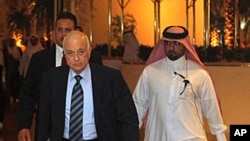Syria faced new sanctions Sunday after ignoring an Arab League deadline to let observers into the country as part of a plan to end a military crackdown on protests, which the U.N. says has killed at least 4,000 people.
Senior league officials said that failure to reach an agreement could lead to outside involvement in the Syrian crisis.
The latest standoff between the two sides came as activists said new violence killed at least nine civilians Sunday, including a father and his three children and a female university professor. At least 25 people died across Syria in anti-government unrest Saturday.
A local activist network put the death toll from violence Sunday at at least 21, but the number could not be independently verified.
Meanwhile, Reuters news agency quoted Syrian activists Sunday as saying that about a dozen secret police have defected from an intelligence compound in Idlib province, near the Turkish border. The activists said a gunfight broke out overnight after the defectors fled the compound and 10 people on both sides were killed or wounded.
A senior U.S. official said Sunday that Syrian President Bashar al-Assad is responsible for deepening the sectarian division in the country. Jeffrey Feltman, U.S. Assistant Secretary of State ((for Near Eastern affairs)), accused Mr. Assad of forcing his minority Alawite sect, an offshoot of Shi'ite Islam, into a bloody conflict with other sects and "fulfilling his own prophecy that Syria is going to move into more chaos and civil war."
Speaking in Amman, Jordan, Feltman also charged that Syria's ally Iran was "actively engaged" in supporting the Syrian regime's lethal crackdown and "facilitating" the murder of Syrian people. He added that both Hezbollah and Iran had agents in Syria to bolster Mr. Assad's waning regime.
The Arab League on Saturday froze assets of 19 top Syrian officials and banned them from traveling to Arab states.
Syria's failure to meet an earlier league deadline resulted in the enactment of a series of measures including a ban on dealings with the central bank, a halt to Arab funding of projects in Syria and a freezing of Syrian government assets.
In Istanbul Saturday, visiting U.S. Vice President Joe Biden praised Turkey for taking steps to address repression in Syria. He added his voice to those calling for Mr. Assad to step down.
Syria has contended its actions are not a crackdown on protests, but a necessary response to attacks by "armed terrorists" on civilians and security personnel.
Some information for this report was provided by AP, AFP and Reuters.




